2022年中考英语第一轮复习九年级(全) Units11~12课件(25张PPT)
文档属性
| 名称 | 2022年中考英语第一轮复习九年级(全) Units11~12课件(25张PPT) | 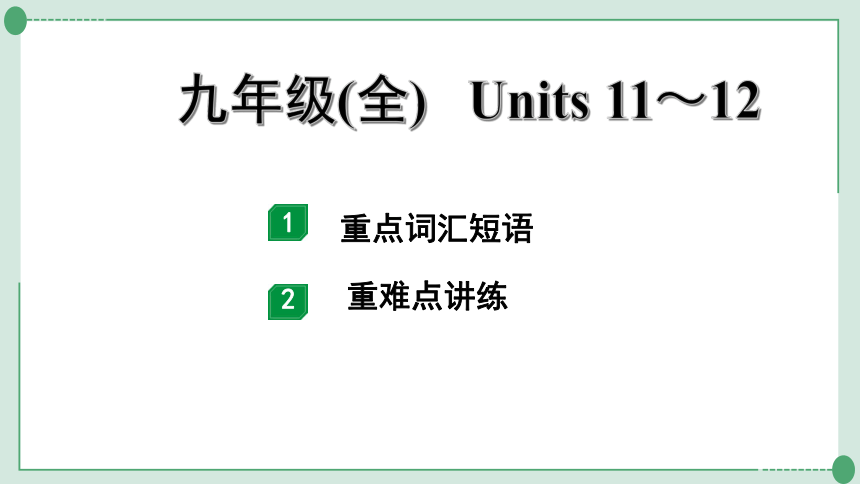 | |
| 格式 | pptx | ||
| 文件大小 | 7.2MB | ||
| 资源类型 | 教案 | ||
| 版本资源 | 人教新目标(Go for it)版 | ||
| 科目 | 英语 | ||
| 更新时间 | 2022-04-21 13:25:06 | ||
图片预览

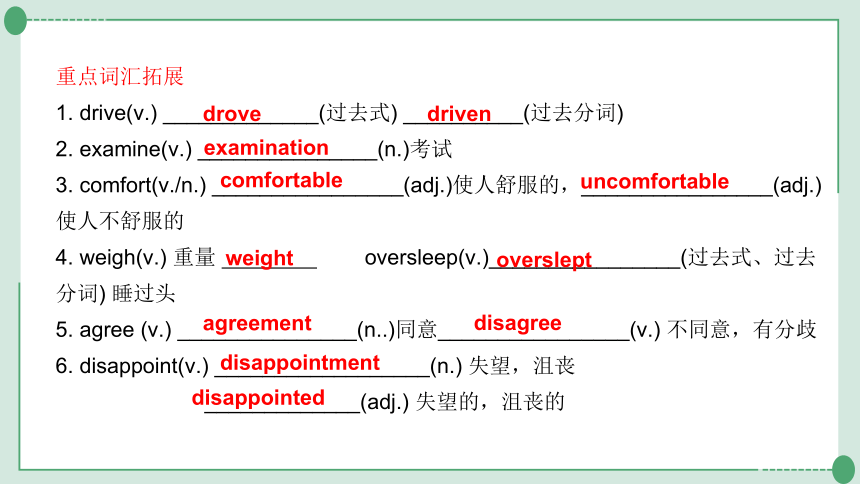
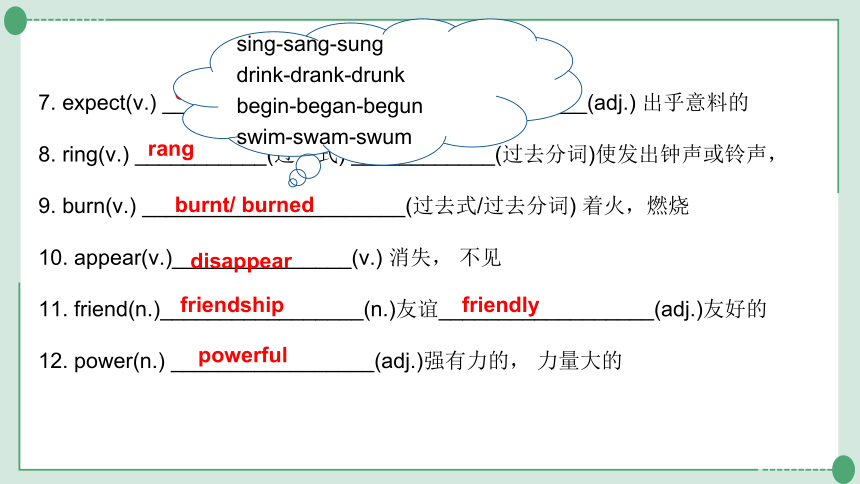
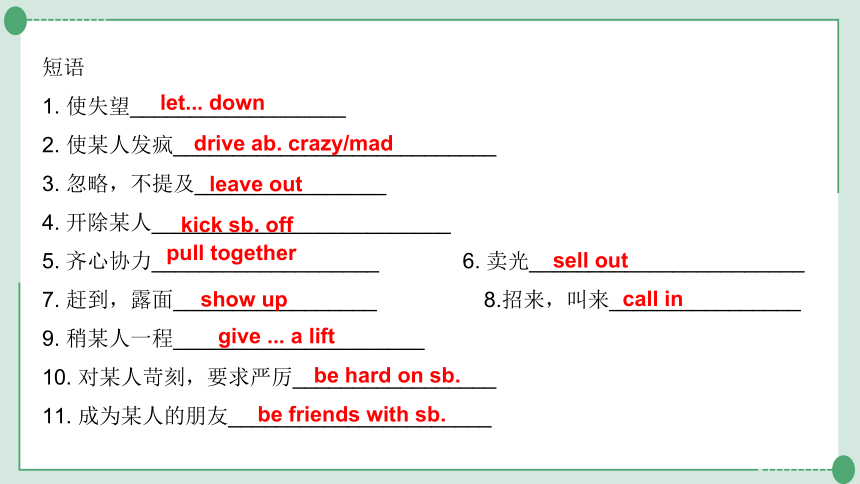
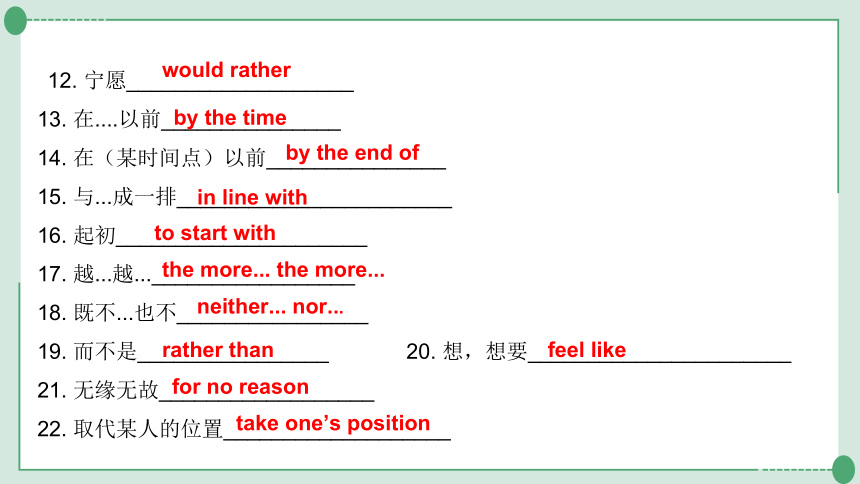
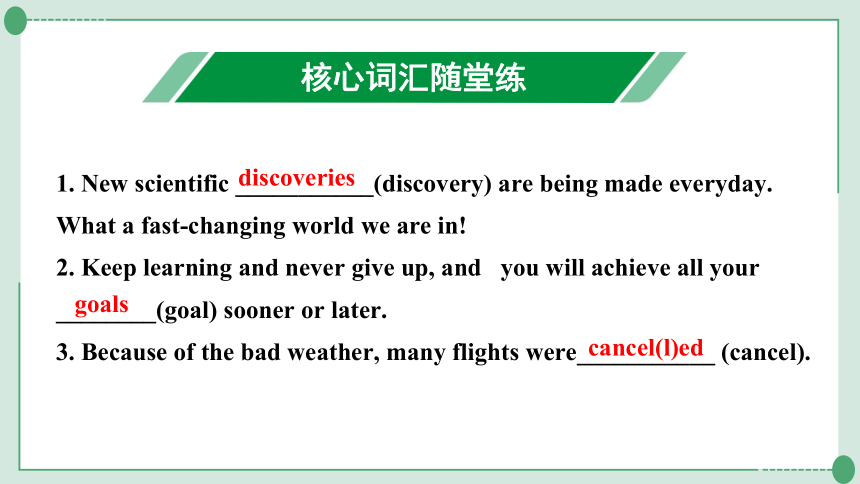
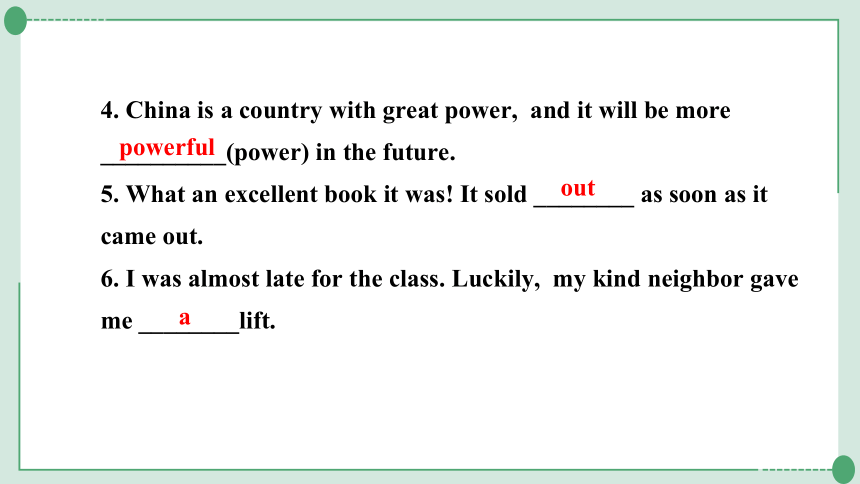
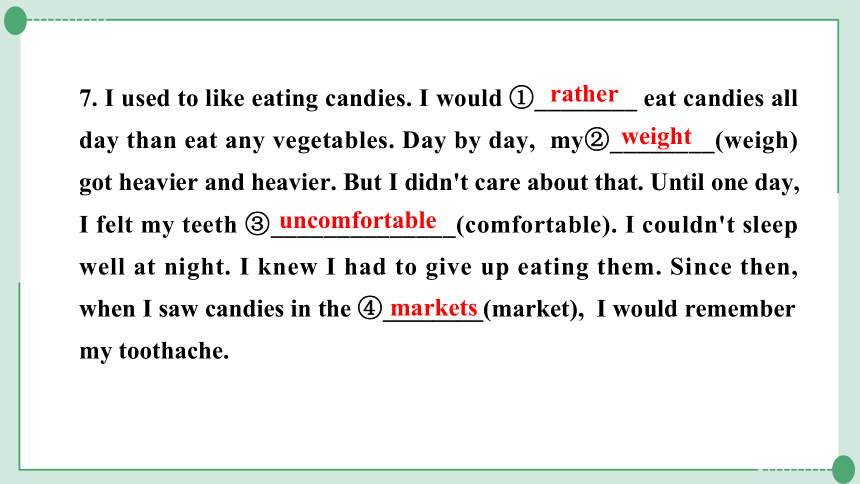
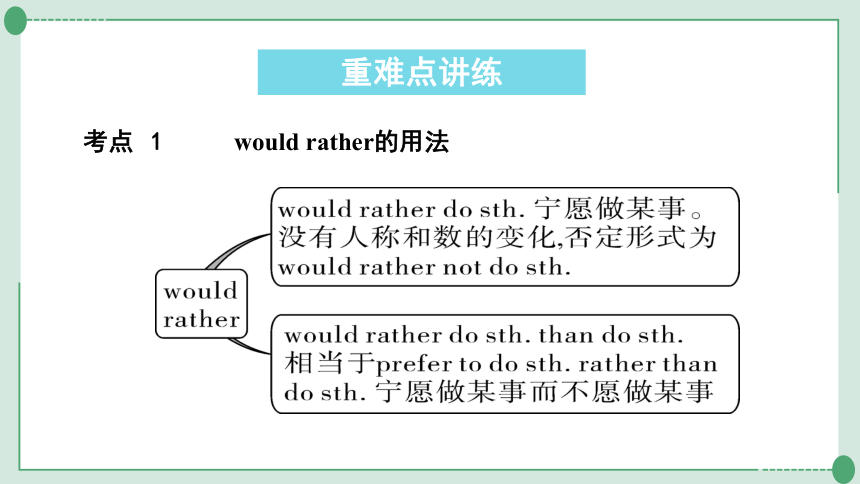
文档简介
(共25张PPT)
重难点讲练
1
2
九年级(全) Units 11~12
重点词汇短语
重点词汇拓展
1. drive(v.) _____________(过去式) __________(过去分词)
2. examine(v.) _______________(n.)考试
3. comfort(v./n.) ________________(adj.)使人舒服的,________________(adj.)使人不舒服的
4. weigh(v.) 重量 oversleep(v.)________________(过去式、过去分词) 睡过头
5. agree (v.) _______________(n..)同意________________(v.) 不同意,有分歧
6. disappoint(v.) __________________(n.) 失望,沮丧
_____________(adj.) 失望的,沮丧的
drove
driven
examination
comfortable
uncomfortable
weight
overslept
agreement
disagree
disappointment
disappointed
7. expect(v.) ___________(adj.)预料的_______________(adj.) 出乎意料的
8. ring(v.) ___________(过去式) ____________(过去分词)使发出钟声或铃声,
9. burn(v.) ______________________(过去式/过去分词) 着火,燃烧
10. appear(v.)_______________(v.) 消失, 不见
11. friend(n.)_________________(n.)友谊__________________(adj.)友好的
12. power(n.) _________________(adj.)强有力的, 力量大的
expected
unexpected
rang
rung
burnt/ burned
disappear
friendship
friendly
powerful
sing-sang-sung
drink-drank-drunk
begin-began-begun
swim-swam-swum
短语
1. 使失望__________________
2. 使某人发疯___________________________
3. 忽略,不提及________________
4. 开除某人_________________________
5. 齐心协力___________________ 6. 卖光_______________________
7. 赶到,露面_________________ 8.招来,叫来________________
9. 稍某人一程_____________________
10. 对某人苛刻,要求严厉_________________
11. 成为某人的朋友______________________
let... down
drive ab. crazy/mad
leave out
kick sb. off
pull together
sell out
show up
call in
give ... a lift
be hard on sb.
be friends with sb.
12. 宁愿___________________
13. 在....以前_______________
14. 在(某时间点)以前_______________
15. 与...成一排_______________________
16. 起初_____________________
17. 越...越..._________________
18. 既不...也不________________
19. 而不是________________ 20. 想,想要______________________
21. 无缘无故__________________
22. 取代某人的位置___________________
would rather
by the time
by the end of
in line with
to start with
the more... the more...
neither... nor...
rather than
feel like
for no reason
take one’s position
核心词汇随堂练
1. New scientific ___________(discovery) are being made everyday. What a fast changing world we are in!
2. Keep learning and never give up, and you will achieve all your ________(goal) sooner or later.
3. Because of the bad weather, many flights were___________ (cancel).
discoveries
goals
cancel(l)ed
4. China is a country with great power, and it will be more
__________(power) in the future.
5. What an excellent book it was! It sold ________ as soon as it came out.
6. I was almost late for the class. Luckily, my kind neighbor gave me ________lift.
powerful
out
a
7. I used to like eating candies. I would ①________ eat candies all day than eat any vegetables. Day by day, my②________(weigh) got heavier and heavier. But I didn't care about that. Until one day, I felt my teeth ③______________(comfortable). I couldn't sleep well at night. I knew I had to give up eating them. Since then, when I saw candies in the ④________(market), I would remember my toothache.
rather
weight
uncomfortable
markets
重难点讲练
1
考点
would rather的用法
1. Little Jack would rather take the risk of being punished than tell a lie to hide his mistake.(英译汉)
________________________________________________________
2. I would rather ride to school every day, because the traffic on my way to school is always too heavy.(英译汉)
________________________________________________________
3. they, a, would rather, in, park, have, walk, the(连词成句)
_________________________________________________________.
小杰克宁愿冒着被惩罚的危险也不愿说谎来掩饰自己的错误。
我宁愿每天骑车上学,因为上学路上的交通总是太拥挤。
They would rather have a walk in the park
即学即练
by the time 表示“到……时候为止;当……的时候”,引导时间状语从句。从句用一般过去时,主句用过去完成时(had done),表示“截止到从句动作发生时,主句动作已经完成,即过去的过去”。
如:By the time Nick called, we had already gone out. 当尼克打电话时,我们已经出去了。
by the time和when的区别
by the time指从过去某一时间到从句所表示的时间为止的这一时间段。when指过去的某个时间点,表述在某一刻的动作或状态。如:When he came, we were having lunch.当他来的时候,我们正在吃午饭。
2
考点
by the time的用法
1. By the time I arrived at the train station, the train I was supposed to take___
already.
A. leaves B. left C. had left D. has left
2. When we climbed to the top of the mountain, we all had been tired out but quite excited.(英译汉)
_______________________________________________________
3. By the time I got up, my father had gone to his office.(英译汉)
_______________________________________________________
C
当我们爬到山顶时,我们都很累但很兴奋。
当我起床的时候,我父亲早已去了他的办公室。
即学即练
考 点 3 make 的用法
Sad movies don’t make John cry. 悲伤的电影没能让约翰哭泣。
make sb. do sth. 意为“使某人做某事”,make 后接省略 to 的不定式作宾语补足语。在此用法中,如果强调动作的承受者,就要用被动语态,此时,省略的 to 必须加上。
Don’t make the boy stand outside. 不要让那个男孩站在外面。
I’m made to cry by sad movies. 悲伤的电影使我哭泣。
[拓展](1) make +sb. +adj. 意为“使某人……;使某人处于什么状态”,
形容词作宾语补足语。
The news made me excited. 那则消息使我激动。
Exercise makes you healthy and strong.
锻炼使你健康和强壮。
(2)“make + 宾语 + 及物动词的过去分词”意为“使某人 / 某事被…… ”。
I can’t make myself understood.
我无法让别人明白我的意思。
即学即练
1. The traffic accident makes us ____that it’s very dangerous for teenagers to ride
motorcycles.
A. realize B. to realize C. realizing D. realized
2. Leo was late for school. So he was made ____the classroom after class.
A. cleaned B. to cleaning C. clean D. to clean
3. The speaker raised his voice so that he could make him ____clearly.
A. hear B. to hear C. heard D. hearing
4. The news that our team won made all of us_______.(excite)
C
A
D
excited
考 点 4 rather than 的用法
rather than 意为“而不是”。用于连接两个平行结构,包括名词、代词、形容词、动词或句子,表示两者中选择前者。
rather than 可以与 instead of 互换,但 instead of 后面接名词或动词的 -ing 形式。
I think you should call him up rather than write a
letter. = I think you should call him up instead of writing a letter.
我认为你应该给他打电话,而不是写信。
即学即练
1. The volunteers raised some money for charities ____buy them
snacks.
A. later on B. even though C. rather than D. in order to
2. I decided to stay at home rather than ____to the supermarket.
A. to going B. went C. goes D. go
3. —What a heavy rain!
—So it is. I prefer ____rather than ____on such a rainy day.
A. to go out;stay at home B. to stay at home;go out
C. going out;stay at home D. staying at home;go out
C
D
B
考 点 5 辨析 alive,living,live 与 lively
I felt lucky to be alive. 能活着我感到很幸运。〔教材 U12 P91〕
(1) alive 是表语形容词,意为“活着的;在世的”,它既可以修饰人,也可以修饰物。
The tiger is still alive. 那只老虎仍然活着。
alive 作定语时,应将其放在被修饰的名词后面。
All the other comrades were killed in the battle. He was the only man alive.
在这场战争中其他所有的同志都牺牲了,他是唯一的幸存者。
(2) living 意为“活着的”,主要用作定语,常置于名词之前,有时也可置于名词之后。也可用作表语。
Every living person has a name. 每一个活着的人都有一个名字。
Is Mrs. Smith still living 史密斯太太还在世吗?
[拓展]the living 表示“活着的人”。
(3) live 读作 /la v/,意为“活着的”,可以作定语,放在所修饰的名词之前,
一般不用来修饰人。live 还可译为“现场直播的”。
The cat was playing with a live mouse.
那只猫在玩弄一只活老鼠。
Do you like a live show or a recorded show
你喜欢直播还是录播?
(4) lively 读作 ,意为“生动的;活泼的;充满生气的”,
可以用来修饰人或物。
Jenny is a lively girl. 珍妮是个活泼的女孩。
Our English teacher has a strange way of making his classes lively and interesting.
我们的英语老师有一种奇特的方法使他的课生动有趣。
即学即练
1. I was moved by the poor cat that tried its best to keep ____after a bad car
accident.
A. alive B. lives C. live D. lively
2. The World Cup in France was the biggest ____ football match in the world.
A. alive B. live C. lively D. living
3. Linda used to be a(n) ____girl. But she feels very lonely now because she
moved to a new city with her parents last week.
A. live B. living C. lively D. alive
A
B
C
考 点 6 辨析 by the end of,at the end of 与 in the end
词组 用法 例句
by the end of 意为“到……末”,往往含有“不迟于”的意思 I had planted hundreds of trees by the end of last month.
到上个月末,我已经种了数百棵树了。
at the end of 后 接 地 点 名 词,意 为 “在……尽头 / 终点”;后接时间名词,意为“在……结束时” You’ll find a hospital at the end of the street. 你会在街道的尽头找到一家医院。
in the end 意为“最后;终于”。表示经过许多变化、困难或琢磨不定的情况之后,某事才发生 I hope our team will win the game in the end.
我希望我们队最后会赢得比赛。
即学即练
1. The price of the book is written ____the book.
A. at the end of B. in the end C. at end D. by the end of
2. After trying many times,the man succeeded ____ .
A. in the end B. at the end of C. at first D. by the end of
3. I will finish watching the TV show ____ the week.
A. at the end B. in the end C. at first D. by the end of
根据汉语意思完成英语句子
4. 我们在今年年底以前就会完成这个工作。
We will finish the work ___________of this year.
5. 最后,他决定买这本书。
____________,he decided to buy this book.
6. 在一天结束的时候,我们返回了家。
We came back home ______________the day.
A
A
D
by the end
In the end
at the end of
词语运用
A few days ago, my grandmother was in hospital. She shared a room with 1. ________ old woman. When I first said hello to her, she just 2. ________(nod) her head. Most of the time, she was sleeping in silence. I could tell from her pale face that she was weak. I usually kissed my grandmother and wished 3. ________(she) sweet dreams when I left. I would wish the woman sweet dreams as well 4. ________ she was awake. She would smile at me.
an
nodded
her
if
Slowly, without words, our 5. __________(friend) was building. Yesterday, I said hello to her for the 6. ________(nine) time. This time she tried to speak. However, even one word was difficult. I understood how sad she was, so I 7. ________(pull) her back from the sad mood. She put her head on my shoulder and cried.
friendship
ninth
pulled
Lately, she shared her 8. ________(feeling) with me, both happiness and sadness. We became 9. _______(close) than before. Then I realized that it doesn't take a long time to become friends with someone. Listen to others 10. __________(careful) and look with your heart rather than your eyes.
closer
carefully
feelings
重难点讲练
1
2
九年级(全) Units 11~12
重点词汇短语
重点词汇拓展
1. drive(v.) _____________(过去式) __________(过去分词)
2. examine(v.) _______________(n.)考试
3. comfort(v./n.) ________________(adj.)使人舒服的,________________(adj.)使人不舒服的
4. weigh(v.) 重量 oversleep(v.)________________(过去式、过去分词) 睡过头
5. agree (v.) _______________(n..)同意________________(v.) 不同意,有分歧
6. disappoint(v.) __________________(n.) 失望,沮丧
_____________(adj.) 失望的,沮丧的
drove
driven
examination
comfortable
uncomfortable
weight
overslept
agreement
disagree
disappointment
disappointed
7. expect(v.) ___________(adj.)预料的_______________(adj.) 出乎意料的
8. ring(v.) ___________(过去式) ____________(过去分词)使发出钟声或铃声,
9. burn(v.) ______________________(过去式/过去分词) 着火,燃烧
10. appear(v.)_______________(v.) 消失, 不见
11. friend(n.)_________________(n.)友谊__________________(adj.)友好的
12. power(n.) _________________(adj.)强有力的, 力量大的
expected
unexpected
rang
rung
burnt/ burned
disappear
friendship
friendly
powerful
sing-sang-sung
drink-drank-drunk
begin-began-begun
swim-swam-swum
短语
1. 使失望__________________
2. 使某人发疯___________________________
3. 忽略,不提及________________
4. 开除某人_________________________
5. 齐心协力___________________ 6. 卖光_______________________
7. 赶到,露面_________________ 8.招来,叫来________________
9. 稍某人一程_____________________
10. 对某人苛刻,要求严厉_________________
11. 成为某人的朋友______________________
let... down
drive ab. crazy/mad
leave out
kick sb. off
pull together
sell out
show up
call in
give ... a lift
be hard on sb.
be friends with sb.
12. 宁愿___________________
13. 在....以前_______________
14. 在(某时间点)以前_______________
15. 与...成一排_______________________
16. 起初_____________________
17. 越...越..._________________
18. 既不...也不________________
19. 而不是________________ 20. 想,想要______________________
21. 无缘无故__________________
22. 取代某人的位置___________________
would rather
by the time
by the end of
in line with
to start with
the more... the more...
neither... nor...
rather than
feel like
for no reason
take one’s position
核心词汇随堂练
1. New scientific ___________(discovery) are being made everyday. What a fast changing world we are in!
2. Keep learning and never give up, and you will achieve all your ________(goal) sooner or later.
3. Because of the bad weather, many flights were___________ (cancel).
discoveries
goals
cancel(l)ed
4. China is a country with great power, and it will be more
__________(power) in the future.
5. What an excellent book it was! It sold ________ as soon as it came out.
6. I was almost late for the class. Luckily, my kind neighbor gave me ________lift.
powerful
out
a
7. I used to like eating candies. I would ①________ eat candies all day than eat any vegetables. Day by day, my②________(weigh) got heavier and heavier. But I didn't care about that. Until one day, I felt my teeth ③______________(comfortable). I couldn't sleep well at night. I knew I had to give up eating them. Since then, when I saw candies in the ④________(market), I would remember my toothache.
rather
weight
uncomfortable
markets
重难点讲练
1
考点
would rather的用法
1. Little Jack would rather take the risk of being punished than tell a lie to hide his mistake.(英译汉)
________________________________________________________
2. I would rather ride to school every day, because the traffic on my way to school is always too heavy.(英译汉)
________________________________________________________
3. they, a, would rather, in, park, have, walk, the(连词成句)
_________________________________________________________.
小杰克宁愿冒着被惩罚的危险也不愿说谎来掩饰自己的错误。
我宁愿每天骑车上学,因为上学路上的交通总是太拥挤。
They would rather have a walk in the park
即学即练
by the time 表示“到……时候为止;当……的时候”,引导时间状语从句。从句用一般过去时,主句用过去完成时(had done),表示“截止到从句动作发生时,主句动作已经完成,即过去的过去”。
如:By the time Nick called, we had already gone out. 当尼克打电话时,我们已经出去了。
by the time和when的区别
by the time指从过去某一时间到从句所表示的时间为止的这一时间段。when指过去的某个时间点,表述在某一刻的动作或状态。如:When he came, we were having lunch.当他来的时候,我们正在吃午饭。
2
考点
by the time的用法
1. By the time I arrived at the train station, the train I was supposed to take___
already.
A. leaves B. left C. had left D. has left
2. When we climbed to the top of the mountain, we all had been tired out but quite excited.(英译汉)
_______________________________________________________
3. By the time I got up, my father had gone to his office.(英译汉)
_______________________________________________________
C
当我们爬到山顶时,我们都很累但很兴奋。
当我起床的时候,我父亲早已去了他的办公室。
即学即练
考 点 3 make 的用法
Sad movies don’t make John cry. 悲伤的电影没能让约翰哭泣。
make sb. do sth. 意为“使某人做某事”,make 后接省略 to 的不定式作宾语补足语。在此用法中,如果强调动作的承受者,就要用被动语态,此时,省略的 to 必须加上。
Don’t make the boy stand outside. 不要让那个男孩站在外面。
I’m made to cry by sad movies. 悲伤的电影使我哭泣。
[拓展](1) make +sb. +adj. 意为“使某人……;使某人处于什么状态”,
形容词作宾语补足语。
The news made me excited. 那则消息使我激动。
Exercise makes you healthy and strong.
锻炼使你健康和强壮。
(2)“make + 宾语 + 及物动词的过去分词”意为“使某人 / 某事被…… ”。
I can’t make myself understood.
我无法让别人明白我的意思。
即学即练
1. The traffic accident makes us ____that it’s very dangerous for teenagers to ride
motorcycles.
A. realize B. to realize C. realizing D. realized
2. Leo was late for school. So he was made ____the classroom after class.
A. cleaned B. to cleaning C. clean D. to clean
3. The speaker raised his voice so that he could make him ____clearly.
A. hear B. to hear C. heard D. hearing
4. The news that our team won made all of us_______.(excite)
C
A
D
excited
考 点 4 rather than 的用法
rather than 意为“而不是”。用于连接两个平行结构,包括名词、代词、形容词、动词或句子,表示两者中选择前者。
rather than 可以与 instead of 互换,但 instead of 后面接名词或动词的 -ing 形式。
I think you should call him up rather than write a
letter. = I think you should call him up instead of writing a letter.
我认为你应该给他打电话,而不是写信。
即学即练
1. The volunteers raised some money for charities ____buy them
snacks.
A. later on B. even though C. rather than D. in order to
2. I decided to stay at home rather than ____to the supermarket.
A. to going B. went C. goes D. go
3. —What a heavy rain!
—So it is. I prefer ____rather than ____on such a rainy day.
A. to go out;stay at home B. to stay at home;go out
C. going out;stay at home D. staying at home;go out
C
D
B
考 点 5 辨析 alive,living,live 与 lively
I felt lucky to be alive. 能活着我感到很幸运。〔教材 U12 P91〕
(1) alive 是表语形容词,意为“活着的;在世的”,它既可以修饰人,也可以修饰物。
The tiger is still alive. 那只老虎仍然活着。
alive 作定语时,应将其放在被修饰的名词后面。
All the other comrades were killed in the battle. He was the only man alive.
在这场战争中其他所有的同志都牺牲了,他是唯一的幸存者。
(2) living 意为“活着的”,主要用作定语,常置于名词之前,有时也可置于名词之后。也可用作表语。
Every living person has a name. 每一个活着的人都有一个名字。
Is Mrs. Smith still living 史密斯太太还在世吗?
[拓展]the living 表示“活着的人”。
(3) live 读作 /la v/,意为“活着的”,可以作定语,放在所修饰的名词之前,
一般不用来修饰人。live 还可译为“现场直播的”。
The cat was playing with a live mouse.
那只猫在玩弄一只活老鼠。
Do you like a live show or a recorded show
你喜欢直播还是录播?
(4) lively 读作 ,意为“生动的;活泼的;充满生气的”,
可以用来修饰人或物。
Jenny is a lively girl. 珍妮是个活泼的女孩。
Our English teacher has a strange way of making his classes lively and interesting.
我们的英语老师有一种奇特的方法使他的课生动有趣。
即学即练
1. I was moved by the poor cat that tried its best to keep ____after a bad car
accident.
A. alive B. lives C. live D. lively
2. The World Cup in France was the biggest ____ football match in the world.
A. alive B. live C. lively D. living
3. Linda used to be a(n) ____girl. But she feels very lonely now because she
moved to a new city with her parents last week.
A. live B. living C. lively D. alive
A
B
C
考 点 6 辨析 by the end of,at the end of 与 in the end
词组 用法 例句
by the end of 意为“到……末”,往往含有“不迟于”的意思 I had planted hundreds of trees by the end of last month.
到上个月末,我已经种了数百棵树了。
at the end of 后 接 地 点 名 词,意 为 “在……尽头 / 终点”;后接时间名词,意为“在……结束时” You’ll find a hospital at the end of the street. 你会在街道的尽头找到一家医院。
in the end 意为“最后;终于”。表示经过许多变化、困难或琢磨不定的情况之后,某事才发生 I hope our team will win the game in the end.
我希望我们队最后会赢得比赛。
即学即练
1. The price of the book is written ____the book.
A. at the end of B. in the end C. at end D. by the end of
2. After trying many times,the man succeeded ____ .
A. in the end B. at the end of C. at first D. by the end of
3. I will finish watching the TV show ____ the week.
A. at the end B. in the end C. at first D. by the end of
根据汉语意思完成英语句子
4. 我们在今年年底以前就会完成这个工作。
We will finish the work ___________of this year.
5. 最后,他决定买这本书。
____________,he decided to buy this book.
6. 在一天结束的时候,我们返回了家。
We came back home ______________the day.
A
A
D
by the end
In the end
at the end of
词语运用
A few days ago, my grandmother was in hospital. She shared a room with 1. ________ old woman. When I first said hello to her, she just 2. ________(nod) her head. Most of the time, she was sleeping in silence. I could tell from her pale face that she was weak. I usually kissed my grandmother and wished 3. ________(she) sweet dreams when I left. I would wish the woman sweet dreams as well 4. ________ she was awake. She would smile at me.
an
nodded
her
if
Slowly, without words, our 5. __________(friend) was building. Yesterday, I said hello to her for the 6. ________(nine) time. This time she tried to speak. However, even one word was difficult. I understood how sad she was, so I 7. ________(pull) her back from the sad mood. She put her head on my shoulder and cried.
friendship
ninth
pulled
Lately, she shared her 8. ________(feeling) with me, both happiness and sadness. We became 9. _______(close) than before. Then I realized that it doesn't take a long time to become friends with someone. Listen to others 10. __________(careful) and look with your heart rather than your eyes.
closer
carefully
feelings
